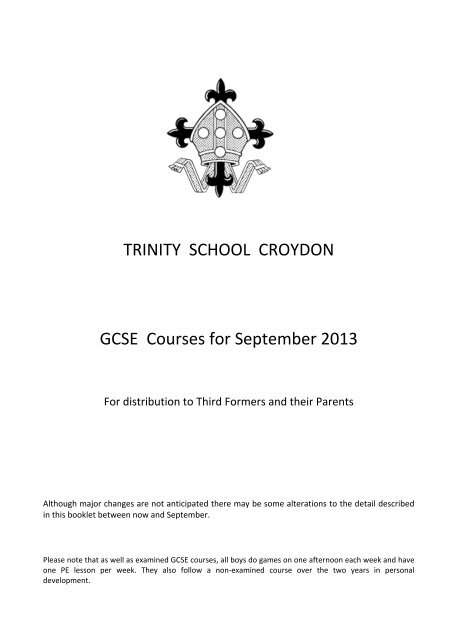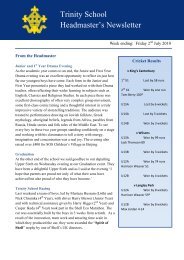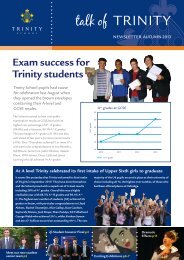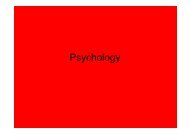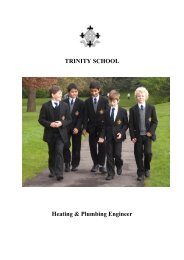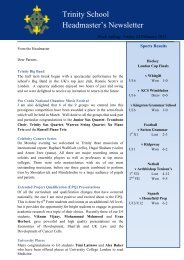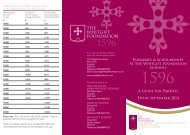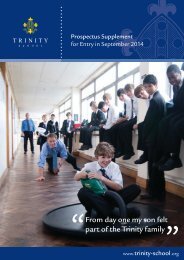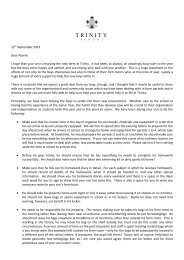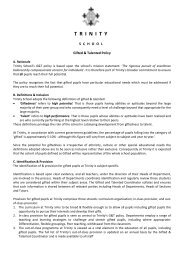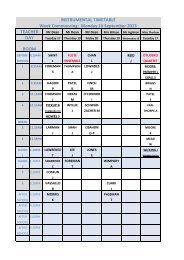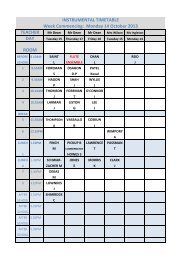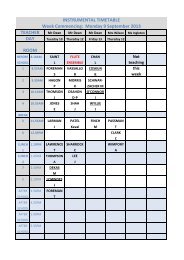TRINITY SCHOOL CROYDON GCSE Courses for September 2013
TRINITY SCHOOL CROYDON GCSE Courses for September 2013
TRINITY SCHOOL CROYDON GCSE Courses for September 2013
You also want an ePaper? Increase the reach of your titles
YUMPU automatically turns print PDFs into web optimized ePapers that Google loves.
<strong>TRINITY</strong> <strong>SCHOOL</strong> <strong>CROYDON</strong><br />
<strong>GCSE</strong> <strong>Courses</strong> <strong>for</strong> <strong>September</strong> <strong>2013</strong><br />
For distribution to Third Formers and their Parents<br />
Although major changes are not anticipated there may be some alterations to the detail described<br />
in this booklet between now and <strong>September</strong>.<br />
Please note that as well as examined <strong>GCSE</strong> courses, all boys do games on one afternoon each week and have<br />
one PE lesson per week. They also follow a non‐examined course over the two years in personal<br />
development.
January <strong>2013</strong><br />
General Certificate of Secondary Education<br />
Your son is now approaching the stage when choices <strong>for</strong> <strong>GCSE</strong> subjects must be made. This booklet contains<br />
in<strong>for</strong>mation on the examined courses taught at Trinity. Some subjects will follow International <strong>GCSE</strong> courses<br />
instead of <strong>GCSE</strong> courses. The International <strong>GCSE</strong> courses are in most cases very similar to the <strong>GCSE</strong> courses<br />
although they often involve less coursework. In each subject we have chosen the course that we feel<br />
provides the best route <strong>for</strong> our students and all of these courses are valued by universities as suitable<br />
qualifications. In this booklet the term <strong>GCSE</strong> will be used to refer to both types of course.<br />
All boys are expected to take <strong>GCSE</strong>s in English Language, English Literature, and Mathematics. In Science all<br />
boys will continue to study Biology, Chemistry and Physics and will take separate examinations <strong>for</strong> each<br />
science. For about half of our boys the results of these will be combined to produce a Double Award grade<br />
which will count as two <strong>GCSE</strong>s; this is a very common <strong>for</strong>m of <strong>GCSE</strong> science certification. For others it will<br />
lead to three separate <strong>GCSE</strong> grades, one in each science. The decision as to which of these routes is<br />
appropriate <strong>for</strong> your son will be made in June after reviewing his progress through the year and in the end of<br />
year examinations and further details will follow then. Whichever route is taken, each boy is taught by three<br />
specialists, one <strong>for</strong> each of the sciences.<br />
In addition to the <strong>GCSE</strong> qualifications above, four additional subjects need to be chosen from this list:<br />
Art<br />
Chinese<br />
Design Technology<br />
Drama<br />
French<br />
Geography<br />
German<br />
History<br />
Latin<br />
Music<br />
Physical Education<br />
Photography<br />
Religious Studies<br />
Spanish<br />
(i) at least one modern <strong>for</strong>eign language must be chosen.<br />
(ii) at least one humanity must be chosen (Geography, History, Religious Studies)<br />
(iii) Art and Photography cannot both be chosen.<br />
Students who have been following the extra Greek course in the Third Year and who opt to take Latin as one<br />
of their <strong>GCSE</strong>s, may choose to continue with Greek as an extra subject taught in additional lessons during one<br />
lunchtime and one after school session.<br />
Every reasonable ef<strong>for</strong>t is made to ensure that the selected subjects are provided in the timetable in any<br />
combination. However subjects can only run if there is sufficient demand and it may not always be possible<br />
to provide every combination. If any difficulties should arise <strong>for</strong> particular individuals, we will discuss the<br />
situation with you as soon as possible.<br />
Boys have been given guidelines about how they should be thinking. Ability and interest are strong<br />
motivators, but it is also important to pursue a broad education. There are very few career implications in<br />
choices made at this stage.<br />
You may well wish to discuss aspects of this decision at the Parents' Evening on 28 th February.<br />
We are asking <strong>for</strong> provisional choices by 12 th February to help us plan ahead, and final decisions will be<br />
needed by 12 th March.<br />
Further ahead will be the decision concerning entry to the Trinity Sixth Form. Admission to the Sixth Form is<br />
not automatic. We would expect Sixth Form students to have achieved A* or A grades in the subjects they<br />
wish to study in the Sixth Form or in closely related subjects. Students who are not likely to achieve this will<br />
need to take further advice about their options. We also expect students to have shown good work habits<br />
during their <strong>GCSE</strong> courses and to achieve a minimum of 51 points (A* = 8, A = 7, B = 6, C = 5) in their best<br />
nine <strong>GCSE</strong> results, including a minimum of 4 A grades. Subject specific grade requirements <strong>for</strong> each AS course<br />
are also included at the end of this document.<br />
N H Denman, Director of Studies
ART and PHOTOGRAPHY<br />
Edexcel <strong>GCSE</strong> in Art and Design (2AD01)<br />
Edexcel <strong>GCSE</strong> in Art and Design: Photography ‐ Lens and Light‐based Media (2PY01)<br />
http://www.edexcel.com/quals/gcse/gcse09/Art/Pages/default.aspx<br />
The Art Department offers two <strong>GCSE</strong> courses: these are officially known as Art and Design [usually<br />
referred to as Art] and Art Photography [usually referred to as Photography]. Each course provides<br />
a good preparation <strong>for</strong> work to both AS and A2 level. The distinction between these courses lies in<br />
their activities.<br />
Introduction<br />
Pupils in both subjects will work within given themes and will develop their art or photography<br />
using a wide range of creative skills and techniques. They will study the work of other artists and<br />
cultures to in<strong>for</strong>m their own practice. Students will receive conceptual and technical guidance and<br />
will be encouraged to develop independent and personal learning styles. They will gain experience<br />
in the following areas:<br />
Art<br />
<br />
<br />
<br />
<br />
<br />
<br />
<br />
Painting<br />
Drawing<br />
Printmaking<br />
Sculpture<br />
Lensless and some digital photography<br />
Graphics, computer manipulated images<br />
Critical and contextual studies<br />
Photography<br />
Learning how to use 35 mm and digital cameras<br />
Processing black and white films; darkroom enlarging processes<br />
Image manipulation using Photoshop software and graphic design<br />
Video animation and editing<br />
Collage and photomontage<br />
Multi‐media and photo sculptures<br />
Some painting and drawing<br />
Historical and technical aspects of the subject are studied alongside the practical work. Boys are<br />
encouraged to develop their organisational and management skills during their studio and location<br />
assignments. All boys require their own 35 mm and/or digital single lens reflex camera be<strong>for</strong>e they<br />
commence the course: use will be made of this in an assignment set <strong>for</strong> completion during the<br />
summer holiday at the end of this academic year.<br />
Assessment<br />
In both art and photography courses the examination consists of the following:<br />
a) 10 hour practical examination (Externally Set Assignment.) Plus preparatory work <strong>for</strong><br />
above in the <strong>for</strong>m of a work journal. Worth 40% of the <strong>GCSE</strong><br />
b) Controlled Assessment. Worth 60% of the <strong>GCSE</strong><br />
The candidate (with staff assistance) will mount a final assessment exhibition of work in the Shaw<br />
Gallery <strong>for</strong> marking and grading by the Art Department and moderation by an external assessor.<br />
Please see Mr A C Smith ‐ Director of Art, should you require further details.
DESIGN AND TECHNOLOGY<br />
Edexcel <strong>GCSE</strong> in Design and Technology: Resistant Materials Technology (2RM01)<br />
http://www.edexcel.com/quals/gcse/gcse09/dt/Resistant/Pages/default.aspx<br />
This exciting, open‐ended and varied course can be tailored to each student’s interests, abilities and<br />
specialities. It builds upon the knowledge, skills and experience which boys have built up in previous<br />
years and develops their abilities to solve the increasingly complex design problems that shape the<br />
modern world. The course also develops and refines time‐management skills and encourages and<br />
rewards an independent working methodology. Students will cultivate their designing and making<br />
skills across a range of projects in the 4 th Year be<strong>for</strong>e deciding on a focus <strong>for</strong> their coursework in<br />
discussion with their teacher. All aspects of the course encourage individuals to view the world<br />
through the eyes of a designer and to question and understand how creative and practical decisions<br />
affect the built environment and shape the development of manufactured products.<br />
The course is open to any students who have an interest in problem‐solving and in developing their<br />
design, analytical, evaluative and making skills as they apply them to a practical design solution.<br />
Students will undertake a major coursework project which contributes 60% of the overall <strong>GCSE</strong><br />
mark. This coursework will test the students’ abilities in the following ways:<br />
<br />
<br />
<br />
<br />
<br />
<br />
<br />
Identify and analyse a design problem.<br />
Employ a variety of research gathering and presentation techniques to clarify their<br />
understanding of the design scenario.<br />
Employ a core of knowledge in the fields of materials, systems and control, manufacturing<br />
processes, mechanisms and structures.<br />
Present realistic design ideas using a range of graphical, ICT techniques and modeling.<br />
Evaluate their ideas in consultation with a client to develop an ideal design solution.<br />
Plan and safely manufacture a product using a range of manufacturing, engineering and<br />
quality control techniques.<br />
Evaluate and test the final product.<br />
Projects may involve boys in a wide range of design and making experiences falling into the<br />
following categories:<br />
Storage Lighting Outdoors Furniture Leisure<br />
Within these general, and deliberately open‐ended topic headings, student groups are encouraged<br />
to develop a wide range of solutions in consultation with staff to complement their own skills,<br />
interests and further educational needs. They will have the opportunity to use our superbly<br />
resourced workshops and studios to develop solutions using the following:<br />
Wood, Metal and Plastic construction.<br />
Engineering processes ‐ traditional and CAD/CAM.<br />
Systems and control – integrating electronic components.<br />
Hot metal processes ‐ soldering, moulding, <strong>for</strong>ming and welding.<br />
Woodturning.<br />
Traditional and computer‐aided model making.<br />
Graphic presentation ‐ traditional and computer generated techniques.<br />
The remaining 40% of the <strong>GCSE</strong> mark is assessed through an end‐of‐course written and design<br />
examination which tests the students’ understanding of Design and Technology. The knowledge will<br />
have been built up by their own experiences of the coursework and during the programme of<br />
complementary studies.
DRAMA<br />
WJEC <strong>GCSE</strong> in Drama<br />
http://www.wjec.co.uk/index.php?subject=47&level=7<br />
<strong>GCSE</strong> Drama is all about understanding what it is like to put yourself in somebody else’s shoes. You<br />
will play many parts in different imaginary situations. You will have the opportunity to create your<br />
own work as well as look at plays written by other people.<br />
Will I enjoy this course?<br />
You will enjoy this course if you want to study a subject that is both practical and creative. You may<br />
have done some acting be<strong>for</strong>e or helped out backstage on a production. You may have always<br />
wanted to have a go at making a play, per<strong>for</strong>ming, making costumes, building a set or operating the<br />
lights but never had the chance. You will enjoy this course if you enjoy working as part of a team as<br />
Drama involves a lot of group work.<br />
How does it follow on from what I have learned be<strong>for</strong>e?<br />
<strong>GCSE</strong> Drama follows on from drama work that you will have done lower down the school. You will<br />
also look at plays in more detail and look at different ways of bringing a script alive on stage.<br />
<strong>GCSE</strong> Examination<br />
The examination <strong>for</strong> Unit 1 of <strong>GCSE</strong> Drama is a practical per<strong>for</strong>mance and a Devised Per<strong>for</strong>mance<br />
Report. These are worth 60% of the marks. You will take part in a play that you have created. You<br />
can either be examined on your acting skills in the per<strong>for</strong>mance or on your design and technical<br />
skills (stage design, costume, masks and makeup, lighting or sound). You will per<strong>for</strong>m the play in<br />
front of an audience and it will be filmed. Your teachers will assess you, and then the marks will be<br />
moderated by the examination board.<br />
The examination of Unit 2 of <strong>GCSE</strong> Drama is very similar to Unit 1 except you choose a piece of<br />
script and direct yourselves with guidance from your teacher. This is worth 20% of your marks and is<br />
assessed by an external examiner.<br />
The final 20% of your marks comes from a 90 minute written exam known as Unit 3, in which you<br />
will be assessed on your ability to analyse one set text as an actor, designer and director and to<br />
evaluate practical work completed in Unit 2.<br />
What other skills might I develop?<br />
As well as acquiring the skills involved in creating and per<strong>for</strong>ming Drama, you will also be able to<br />
acquire skills in working with others, problem solving and communication. You will find that Drama<br />
will help you feel more self‐confident and prepare you to deal with a range of different situations<br />
and people.
ENGLISH STUDIES<br />
Within the five weekly periods which are allocated to English, all boys will study <strong>for</strong> two <strong>GCSE</strong><br />
subjects; English Language and English Literature. Work will involve discussion and participation in<br />
a range of speaking and listening activities, response to a variety of written material to develop<br />
understanding of themes and attitudes and the ways writers achieve their effects, and development<br />
of the ability to convey meaning effectively in writing, matching style to audience and purpose.<br />
ENGLISH LANGUAGE<br />
Edexcel International <strong>GCSE</strong> in English Language (Specification A) (4EA0)<br />
http://www.edexcel.com/quals/igcse/int‐gcse11/eng‐langa/Pages/default.aspx<br />
A written examination paper carrying 70% of the total marks is taken at the end of the two‐year<br />
course. In it boys are tested on their understanding of selected passages of written English. Some of<br />
these will be discussed and annotated in class. Also examined are their abilities to use these and<br />
other stimulus materials to write <strong>for</strong> different audiences in a variety of modes. Boys will learn and<br />
practise the necessary skills during the course.<br />
There is also a written coursework component which offers the opportunity <strong>for</strong> boys to engage in a<br />
wider range of styles and topics than in the examination. Creative writing, extended project work,<br />
research and retrieval skills, the presentation of facts and opinions, media studies, ‐ all these may<br />
find a place in the coursework programme. Boys will also write in response to an anthology<br />
produced by the examination board. A folder of Coursework is kept and a selection made <strong>for</strong> final<br />
<strong>GCSE</strong> assessment (20% of the total mark).<br />
The Speaking and Listening Coursework component (10% of the total mark) will involve the<br />
development and assessment of boys' speaking and listening skills as they engage in activities such<br />
as debating, role play, <strong>for</strong>mal talks, class and group discussion.<br />
ENGLISH LITERATURE<br />
Edexcel International <strong>GCSE</strong> in English Literature (4ET0)<br />
http://www.edexcel.com/quals/igcse/int‐gcse11/eng‐lit/Pages/default.aspx<br />
A written examination carries 70% of the marks and is based on study of one drama and one prose<br />
text chosen from a list prescribed by the Examining Board.<br />
The coursework component carries 30% of the marks. It requires the study of poetry drawn from an<br />
anthology produced by the examination board as well as poems chosen by teacher and/or boys.<br />
This will allow some freedom to pursue individual interests and complete a variety of written<br />
responses.<br />
In addition to fulfilling these examination requirements, boys will be given the opportunity to<br />
develop their skills through study of one additional drama text and one additional prose text. Study<br />
of these texts will be tested through internal examinations at the end of Fourth Year. In addition<br />
boys will be encouraged to develop and extend a love of reading <strong>for</strong> its own sake through<br />
undertaking a programme of individual private reading and completing a personal, critical log of<br />
their reading. This too will be assessed.<br />
The demands of the two subjects offer boys an introduction to at least some of the wealth of<br />
literature available to them, and an opportunity to develop confidence and proficiency in their use<br />
of language, whether spoken or written.
GEOGRAPHY<br />
Edexcel International <strong>GCSE</strong> in Geography (4GE0)<br />
http://www.edexcel.com/quals/igcse/int‐gcse11/geography/Pages/default.aspx<br />
Geography has always been a very dynamic subject, providing the flexibility to study a wide range of<br />
topics and contemporary world issues making it relevant to so much of the world around us all.<br />
Having studied elements of the Hazardous Environments (Earthquakes and Volcanoes), Coastal<br />
Environments (Depositional features and Fieldwork) and Globalisation and Migration (Population<br />
and Migration) modules in the Third year, you should have a good feeling <strong>for</strong> the content and depth<br />
of material which is required at <strong>GCSE</strong>.<br />
Studying Geography at <strong>GCSE</strong> builds upon the solid foundations you will have established in the<br />
Junior School and helps you to synthesise and ultimately analyse in<strong>for</strong>mation at a high<br />
level. Geography also enables you to develop literacy, graphicacy and numeracy, as well as a wide<br />
range of geographical skills. Since <strong>September</strong> 2009 we have been following the new International<br />
<strong>GCSE</strong> specification, which we feel gives our students a broad and varied course, which balances an<br />
understanding of physical, human and environmental geography.<br />
The Edexcel International <strong>GCSE</strong> in Geography:<br />
• Aims to actively engage students in the study of Geography, developing them as critical and<br />
reflective thinkers with enquiring minds.<br />
• Promotes an understanding of our responsibilities as global citizens and of how students<br />
can contribute to a future that is sustainable and inclusive.<br />
• Encourages the use of out‐of‐classroom activities and fieldwork to underpin knowledge and<br />
understanding, yet does not require a coursework write‐up.<br />
• Is assessed through one external examination.<br />
• Is designed to have a clear and manageable case study requirement.<br />
• Provides a solid basis <strong>for</strong> progression to GCE AS and Advanced qualifications in Geography.<br />
Examination<br />
The single tier examination paper (3 hour) will contain a variety of question types, such as multiple<br />
choice; short and extended answers; graphical and data questions and fieldwork questions. The<br />
content of the specification is both conceptual and issues‐based, and is divided into traditional core<br />
of physical (1&2) and human (3‐4) geography, as well as contemporary global issues (5).<br />
The topics covered are:<br />
1. Coastal environments<br />
2. Hazardous environments<br />
3. Economic activity and energy<br />
4. Urban environments<br />
5. Globalisation and migration<br />
Fieldwork<br />
There is no written coursework requirement; however the specification requires that fieldwork is<br />
undertaken in a variety of different environments to aid understanding of the core themes. There<br />
are a variety of individual field days <strong>for</strong> the different topic areas including an afternoon in the<br />
London Docklands to assess the nature of the changing employment in the area.<br />
Overall, the course teaches students about many of the processes that shape the world around us,<br />
but more importantly it helps them to make their own in<strong>for</strong>med and balanced decisions about the<br />
world in which we live. The course is an excellent foundation <strong>for</strong> A‐level and beyond.
HISTORY<br />
Edexcel International <strong>GCSE</strong> in History (4HI0)<br />
http://www.edexcel.com/quals/igcse/int‐gcse11/history/Pages/default.aspx<br />
The basic philosophy behind the Edexcel International <strong>GCSE</strong> is to test not what candidates learn by<br />
heart, but what they know, understand and can do. The great advantage of this course is that it<br />
allows the study of a range of countries, cultures and types of history which will encourage learning<br />
above and beyond the syllabus. By the end of their two years studying History, all students will have<br />
learnt not only about democracy, fascism and communism but also transferrable skills such as<br />
constructing an argument, writing fluently and analysing source material. It is our philosophy in the<br />
History Department to teach boys at a level that will not only ensure examination success, but will<br />
additionally prepare them <strong>for</strong> the Sixth Form and beyond. The History course will do just this;<br />
teaching students about the background to the world we live in and providing good preparation <strong>for</strong><br />
further study of a multitude of subjects at AS and A2 levels.<br />
Assessment: There are two examinations of 90 minutes each. The first exam will encompass<br />
Section A of the course, the second Section B.<br />
Content:<br />
Section A<br />
i) Development of Dictatorship: Weimar and Nazi Germany 1919‐1945<br />
Students explore Germany between the wars and the impact of WW2 on life within the country.<br />
The greatest focus is on the rise of the Nazis and the state they led, with clear development of the<br />
collapse of the Weimar government, the Wall Street Crash and the consolidation of power. The<br />
course also explores Nazi social, economic and racial policy.<br />
ii) A world divided: Superpower Relations 1945‐1962<br />
Students study the causes and events of the Cold War, focusing on relations between the USA and<br />
USSR. The course will begin with an introduction to the political systems of the two countries, a<br />
fundamental starting point in any post‐war study. The main focus of the module is concerned with<br />
the interplay between the superpowers and the boys will investigate the flashpoints that occur in<br />
this period. This will include the division of Berlin, the Communist incursions into Eastern Europe,<br />
the Cuban Missile Crisis and the beginnings of the Vietnam War.<br />
Section B<br />
iii) The Fall of Communism in Eastern Europe: 1979‐91<br />
Leading on from the key issues involved in the Cold War power struggle, this unit will explore the<br />
end of the Cold War. Through studying the events in Poland, Czechoslovakia, and the Soviet Union<br />
which led to the fall of Communism and the reunification of Germany, students will be encouraged<br />
to assess and appreciate the making of modern Europe.<br />
iv) Conflict, Crisis and Change: China c1911‐1990<br />
The module begins with an exploration of the Chinese Revolution and the rise of the Communist<br />
Party/ Boys then study the civil war, the Great Leap Forward and the Cultural Revolution be<strong>for</strong>e<br />
finishing with the abandonment of Maoism and the Deng Revolution.
LATIN<br />
OCR <strong>GCSE</strong> in Latin J281<br />
http://www.ocr.org.uk/qualifications/gcse‐latin‐j281‐j081‐from‐2009/<br />
Latin <strong>GCSE</strong> opens a window into Roman life and literature, giving students their first taste of original<br />
Latin texts as they continue to develop their skills with the language. On top of this, the course also<br />
gives the opportunity <strong>for</strong> students to explore and analyse archaeological and literary evidence left<br />
<strong>for</strong> us by the Romans through the new Sources paper. Students will have four Latin lessons a week,<br />
as well as the chance to take trips to the British Museum and further afield to complement their<br />
work in the classroom and further their understanding of the Ancient World.<br />
The <strong>GCSE</strong> Latin Examination consists of four papers:<br />
Papers 1&2 (Language Work) 25%+25%<br />
These consist of a series of comprehension questions in English on Latin passages, including<br />
questions about the derivation of English words from Latin, and the translation of other passages<br />
into English. There is a set vocabulary list. The Cambridge Latin Course continues to be used to<br />
prepare <strong>for</strong> this paper.<br />
Paper 3 (Verse Literature) 25%<br />
This consists of translation and comprehension questions on passages from either Book 2 of Virgil's<br />
poem the Aeneid, which describes the incident of the Trojan horse and the destruction of the<br />
ancient city of Troy, or an antologu of poems on the topic of prophecies and omens. The questions<br />
test knowledge of content and background, and literary appreciation of the work.<br />
Paper 4 (Roman Life Topics) 25%<br />
This consists of questions on literary and pictorial sources from the Roman Empire on the topics of<br />
work, domestic life and entertainment such as the army, slaves, food and drink, chariot racing and<br />
baths. It will require both factual knowledge of the topic and a analytical and evaluative response to<br />
source material. The study of this topic develops work done lower down in the school on the<br />
background topics.<br />
There is no translation into Latin, and no coursework.<br />
As well as exploring the exotic world of Roman civilisation ‐ by turns mysterious, luxurious,<br />
sophisticated and distasteful ‐ the study of Latin develops logic and analytical skills, immeasurably<br />
improves understanding of both English and other European modern languages, and allows<br />
students to get acquainted with the very roots of the culture they live in.<br />
GREEK<br />
OCR <strong>GCSE</strong> in Classical Greek J291<br />
http://www.ocr.org.uk/qualifications/gcse‐classical‐greek‐j291‐j091‐from‐2012/<br />
Students currently taking the Greek course in the Third Year may apply to carry on with the course<br />
to <strong>GCSE</strong>. One session will run during a lunchtime from 1.40 – 2.15pm, and one session from 4.00 –<br />
5.00pm on a different day after school. This is the equivalent of just under three timetabled periods<br />
per week and hence this course sets a challenging but manageable pace and is only suitable <strong>for</strong><br />
those who have demonstrated strong skills in Classics already and who will be taking Latin at <strong>GCSE</strong><br />
as one of their options. It will also, however, provide the opportunity to study a second fascinating<br />
classical language and culture. The four exam papers follow the same <strong>for</strong>mat as Latin above.
MATHEMATICS<br />
Edexcel International <strong>GCSE</strong> in Mathematics (Specification A) (4MA0)<br />
http://www.edexcel.com/quals/igcse/igcse09/maths/mathsA/Pages/default.aspx<br />
All boys will study Higher Tier Mathematics and are entered <strong>for</strong> the examination at the end of the<br />
Fifth Year. Those who are able to progress more quickly in the subject are placed in sets where the<br />
depth and breadth of the course are greater, providing them with appropriate challenges. Boys in<br />
set one will there<strong>for</strong>e study work in addition to the <strong>GCSE</strong> course and may be entered <strong>for</strong> an<br />
additional examination beyond <strong>GCSE</strong>. Weaker mathematicians will be placed in smaller sets<br />
allowing more individual help from their teacher. Higher tier covers grades from A* to D.<br />
The assessment involves a final examination of two written papers (50% each). Calculators are<br />
permitted in each paper. There is no coursework element to this course.<br />
The course covers the four areas below, and there are underlying concepts which link these.<br />
Number includes the principles of arithmetic, ratio, percentage, standard <strong>for</strong>m and index <strong>for</strong>m,<br />
number patterns and harder topics such as surds. Mental arithmetic and the use of a calculator are<br />
included.<br />
Algebra includes much that is traditional in school mathematics such as the trans<strong>for</strong>mation of<br />
<strong>for</strong>mulae, simultaneous equations, quadratic functions and simple calculus. The algebra of sets and<br />
functions is also included.<br />
Shape, Space and Measures incorporates the geometrical topics: this includes symmetry, areas,<br />
volume, trigonometry, circle theorems and geometrical trans<strong>for</strong>mations.<br />
Handling Data includes the important ideas of statistical interpretation and probability.<br />
It is our aim to provide a course which is both useful and enjoyable. We are anxious that all pupils<br />
should complete the course feeling confident in their ability to make use of mathematics in their<br />
future lives and we recognise that <strong>for</strong> some pupils this will be at a more sophisticated level than <strong>for</strong><br />
others.<br />
Pupils are encouraged to approach members of the department if they have queries or are<br />
concerned about their learning. Parents may also feel free to contact us if they feel that a discussion<br />
would be helpful.
MODERN FOREIGN LANGUAGES<br />
European Languages: French, German and Spanish<br />
Edexcel International <strong>GCSE</strong> in French (4FR0), German (4GN0), Spanish (4SP0)<br />
http://www.edexcel.com/quals/igcse/int‐gcse11/Pages/default.aspx<br />
European languages in the Fourth and Fifth Years build the bridge between gaining a basic<br />
understanding of the language in the Lower School and in‐depth study at AS and A level. The aim is<br />
to provide students with language skills that are highly sought after in an ever changing job market,<br />
but at the same time to give them an understanding of different cultures and life‐styles. European<br />
languages, there<strong>for</strong>e, play an integral part in the personal development of students by helping them<br />
to build self‐confidence in dealing with a wide variety of topics of the modern world.<br />
French, German and Spanish are all taught to <strong>GCSE</strong>, A‐Level and Oxbridge Entrance.<br />
International <strong>GCSE</strong> from Edexcel<br />
There is only tier of entry: The grade range, there<strong>for</strong>e, covers all grades from A* to G.<br />
The language to be met covers a range of topics from a variety of areas of modern life: Home and<br />
abroad; education and employment; house, home and daily routine; the modern world and the<br />
environment (including current affairs, use of ICT, social issues, etc.); social activities, fitness and<br />
health.<br />
The four skill areas are organised in three exam papers:<br />
Listening (35 minutes). Exam exercises request the ability to listen <strong>for</strong> detail in complex texts. The<br />
materials used convey the spirit of authenticity or have been recorded in the relevant country.<br />
Language items range from short extracts to more complex dialogues and passages.<br />
Reading and Writing (90 minutes). The materials used will allow students to understand signs and<br />
simple messages as well as to comprehend more difficult passages including letters, magazine<br />
extracts, leaflets and brochures. Students will learn how to skim‐read longer texts and how to<br />
extract the necessary in<strong>for</strong>mation in the shortest possible time.<br />
Students will also be required to produce a short response in writing to one of the reading exercises<br />
and one extended piece of writing, reacting to a short stimulus. They will have to demonstrate their<br />
ability to write creatively and imaginatively. The more complex a language they can use the more<br />
marks they will be awarded.<br />
Speaking (10 minutes). Students will be given the opportunity to describe a picture of their own<br />
choice, followed by an initial discussion. Thus, they are given the opportunity to start the exam<br />
conversation with a topic of their interest and liking. The remaining two thirds of the conversation<br />
will cover two out of the overall five topic areas. In this discussion students will have to<br />
demonstrate that they can take part in a meaningful conversation, in which they will have to<br />
respond spontaneously and creatively.<br />
A period of time spent abroad is of great value. Every year trips suitable <strong>for</strong> most age groups are<br />
organised by the French, German and Spanish departments. It is recommended that as many as are<br />
able should benefit from them.
CHINESE (MANDARIN)<br />
Edexcel <strong>GCSE</strong> in Chinese (2CN01)<br />
http://www.edexcel.com/quals/gcse/gcse09/mfl/chinese/Pages/default.aspx<br />
Chinese is now well established at Trinity with over one hundred students in the school taking<br />
Chinese. <strong>GCSE</strong> has been offered at Trinity <strong>for</strong> the last four years and students achieve outstanding<br />
results. As part of the course students will have regular oral language lessons with a native speaker<br />
of Chinese.<br />
Chinese <strong>GCSE</strong> assesses skills in speaking, writing, reading and listening. Reading and listening exams<br />
can be taken at foundation and higher levels and are assessed by examination. It is envisaged that<br />
students will take the four skills at the higher level. The published syllabus outlines very clearly the<br />
topic areas to be covered and there is also a comprehensive list of minimum core vocabulary.<br />
The four skills are examined as follows<br />
Writing: Two examinations (1 hour each), taken in January and March of the 5 th year<br />
Controlled assessment (course work style) examinations to be taken in January and March in the<br />
fifth year. Students will be given the task be<strong>for</strong>e the exam and they will have time to prepare <strong>for</strong> the<br />
exam. They can take into the exam a notes sheet and a bilingual dictionary.<br />
Speaking: Two examinations (4‐6 minutes each), taken in November and March of the 5 th year<br />
Controlled assessment (course work style) examinations to be taken in November and March in the<br />
fifth year. Students will be given the task be<strong>for</strong>e the exam and they will have time to prepare <strong>for</strong> the<br />
exam. They can take a notes sheet into the exam.<br />
Reading: One examination (50 minutes), taken in June of the 5 th year<br />
Listening: One examination (45 minutes), taken in June of the 5 th year<br />
It is hoped that we will be able to offer a visit to China <strong>for</strong> students taking Chinese to <strong>GCSE</strong>.
MUSIC<br />
Edexcel <strong>GCSE</strong> in Music (2MU01)<br />
http://www.edexcel.com/quals/gcse/gcse09/music/Pages/default.aspx<br />
This course is ideal <strong>for</strong> anyone who enjoys per<strong>for</strong>ming and composing, and especially <strong>for</strong> those who<br />
listen to a lot of music. It caters <strong>for</strong> a wide range of abilities, incorporating all styles of music, from<br />
Handel and Mozart to Jeff Buckley and Moby. Although the course may have an immediate appeal<br />
to pupils who are already involved in school music activities, it is designed to include those whose<br />
experience may be less <strong>for</strong>mal. A genuine interest in music is the main criterion <strong>for</strong> choosing to take<br />
this subject. Ideally, students aiming <strong>for</strong> an A/A* at <strong>GCSE</strong> should be at or near to Grade 5 standard<br />
on their instrument or voice by the Spring term of the Fifth year.<br />
PERFORMING (30%) Internally assessed, externally moderated.<br />
Candidates will have to submit:<br />
a) One solo per<strong>for</strong>mance<br />
b) One ensemble per<strong>for</strong>mance<br />
Candidates may offer a second instrument if they wish.<br />
LISTENING AND APPRAISING (40%) Written examination, externally marked.<br />
The emphasis in this element is on the development of critical listening applied to a wide range of<br />
musical styles relating to the study of set works from four areas of study:<br />
i) Western Classical Music 1600 ‐ 1899<br />
ii) Music in the 20 th Century<br />
iii) Popular Music in Context<br />
iv) World Music<br />
COMPOSING (30%) Internally assessed, externally moderated.<br />
During the two‐year course, the candidates build up a portfolio of compositions written to briefs<br />
relating to the areas of study. At the end of the two years, the two best compositions are selected<br />
and submitted <strong>for</strong> assessment.
PHYSICAL EDUCATION<br />
AQA <strong>GCSE</strong> in Physical Education (4890)<br />
http://web.aqa.org.uk/qual/newgcses/science/new/phy_edu_overview.php?id=03&prev=03<br />
The Physical Education course offers you the chance to put the sporting skills you have already<br />
learned together with some new ones to earn the majority of the marks towards an excellent <strong>GCSE</strong><br />
grade. The work you have done in Games and PE lessons has put you in a very good position to do<br />
well in the practical elements of the course. To prosper you need to demonstrate skills and playing<br />
ability in 4 sports/activities from an extensive range. The coursework element is completed by<br />
demonstrating the ability to analyse sporting per<strong>for</strong>mance and suggest ways to improve.<br />
Boys who show the skills outlined above will have gained a large chunk of marks towards the final<br />
grade but will need to augment these marks in an examination which will cover such topics as:<br />
Health and Fitness; Diet; Fitness and Training; Anatomy and Physiology; Exercise Physiology; Safety<br />
and Risk Assessment; Sports Injuries and First Aid; Organisation of sport; The Media, Sponsorship<br />
and Sport Psychology.<br />
Examination ‐ 40%<br />
40% of the total marks will be awarded <strong>for</strong> a theory examination covering the areas of study<br />
mentioned above.<br />
Coursework ‐ 60%<br />
60% of the marks are awarded <strong>for</strong> coursework and a practical examination of sporting per<strong>for</strong>mance.<br />
Boys will need to present their practical accomplishments in 4 sporting activities drawn from a<br />
variety of sporting disciplines. This practical per<strong>for</strong>mance represents 50% of the total marks.<br />
The final 10% of marks are awarded <strong>for</strong> reflection upon and analysis of strengths and weaknesses in<br />
practical per<strong>for</strong>mances from one of their chosen activities.<br />
It is envisaged that boys will experience both theory and practical lessons, although there will be<br />
heavy reliance upon the sporting achievements and progress already achieved by most of Trinity’s<br />
sportsmen in order that the less familiar activities can be brought up to good standards.<br />
Participation in school practices and matches will be required <strong>for</strong> boys undertaking sports played<br />
within school.
RELIGIOUS STUDIES<br />
Edexcel <strong>GCSE</strong> in Religious Studies (2RS01)<br />
http://www.edexcel.com/quals/gcse/gcse09/rs/Pages/default.aspx<br />
This is an exciting liberal course <strong>for</strong> any student who wishes to be literate in the ideas, ethics and<br />
philosophies that are shaping the modern world. It inspects the consequences of what is claimed in<br />
Ethics, Personal Values and the public arena of modern living at national and international levels.<br />
The course is ideal <strong>for</strong> students who want to learn to argue effectively and hold up what is being<br />
said to well‐in<strong>for</strong>med scrutiny. Students can explore freely the way that religious and non‐religious<br />
beliefs affect some of the fundamental issues at the heart of the 21st C. and are encouraged to<br />
know how to develop key intellectual skills with which to <strong>for</strong>m their own, in<strong>for</strong>med views.<br />
It is open to students of whatever outlook who want to develop a creative understanding of how<br />
and why individuals and peoples think and act the way they do. Anyone who enjoys in‐depth<br />
discussion and in<strong>for</strong>med argument about the way modern life is developing will appreciate this<br />
modern <strong>GCSE</strong> RS Course. It is excellent <strong>for</strong> cross‐curricular studies: the topics studied in RS ‐ shown<br />
below ‐ enhance enjoyment of the Sciences, Arts and Humanities. Because the course touches so<br />
many aspects of the curriculum and invites intellectual imagination, it brings insights which can<br />
appeal in a wide range of ambitions in higher education and in employment.<br />
Each year RS Overseas visits are held. These are low‐cost optional events. Destinations include<br />
Rome, Istanbul, and Milan. There are also UK visits to cultural events and lectures, including<br />
Theatre, Film and Exhibitions. The Department welcomes suggestions from students and their<br />
families.<br />
Syllabus<br />
The Course studied is Edexcel’s RS <strong>GCSE</strong> Specification, Units 1 and 8, entitled ‘Religion and Life’ and<br />
‘Religion and Society’: Christianity and Islam. Full details of the Course can be obtained from the RS<br />
Department. There are two Exam Papers, each of 1hr 30mins. These are usually spaced out in the<br />
<strong>GCSE</strong> Exam Timetables to allow candidates easy preparation. Because there is no Coursework<br />
involved, the course has plenty of room <strong>for</strong> individuals to explore the topics in depth.<br />
Topics studied:<br />
Religion, Law and Human Rights including: Crime and Punishment; Media Studies; Racial and Gender<br />
equality<br />
Medical ethics: Genetics; Cloning; Abortion; Euthanasia; Fertility and Transplant medicine Religion,<br />
Politics and Ethics: War and Peace; United Nations; Situation Ethics; Utilitarianism; Economics and<br />
Poverty<br />
Religious Beliefs and Science: Does God exist; Origins of the Universe; Evolution; Theories of Good<br />
and Evil; Miracles; Life after Death,<br />
Environment: Global Warming; Pollution; Natural Resources<br />
Personal morality: Family, Marriage and Divorce; Sexual ethics; Drugs and Alcohol<br />
There is a very wide range of books and ICT media resources. The Department also has a policy of<br />
buying in special individual purchases <strong>for</strong> pupils’ own personal interests. This <strong>GCSE</strong> course is the<br />
ideal preparation <strong>for</strong> anyone who may wish to study Religious Studies at A level where the study of<br />
Philosophy, Ethics and Religion are key features.<br />
If you choose the <strong>GCSE</strong> course you will find that the topics in the Third Form course have given you<br />
a good start in developing the skills needed <strong>for</strong> success at <strong>GCSE</strong>.
SCIENCE<br />
Edexcel International <strong>GCSE</strong> in Science (Double Award) (4SC0)<br />
http://www.edexcel.com/quals/igcse/int‐gcse11/science/Pages/default.aspx<br />
OR<br />
Edexcel International <strong>GCSE</strong>s in separate science subjects:<br />
Biology (4BI0) http://www.edexcel.com/quals/igcse/int‐gcse11/biology/Pages/default.aspx<br />
Chemistry (4CH0) http://www.edexcel.com/quals/igcse/int‐gcse11/chemistry/Pages/default.aspx<br />
Physics (4PH0) http://www.edexcel.com/quals/igcse/int‐gcse11/physics/Pages/default.aspx<br />
All boys follow Edexcel International <strong>GCSE</strong> courses, which are particularly suitable <strong>for</strong> our students.<br />
They have a straight<strong>for</strong>ward assessment structure with very clear goals and requirements, spelt out<br />
in detail in the relevant specifications. Academic rigour and sensible breadth of content mean that<br />
both Triple and Double Award <strong>for</strong>mats af<strong>for</strong>d an excellent grounding <strong>for</strong> the many who will want to<br />
continue with Science subjects in the Sixth Form.<br />
About half the boys at Trinity study the Double Award course, in which the marks <strong>for</strong> all three<br />
subject papers are added together to produce a single overall score. This then yields pairs of<br />
identical or adjacent <strong>GCSE</strong> grades such as A*A*, A*A, AA, AB etc. These grades are not attached to<br />
any individual subject within the mix, but give an overall measure of achievement. Others study the<br />
Triple Award course which leads to three separate <strong>GCSE</strong> grades, one <strong>for</strong> each of the Sciences. These<br />
can be as different as individual subject per<strong>for</strong>mance merits. In either case the work follows on<br />
seamlessly from the material covered in earlier years and in both courses the three sciences<br />
continue to be taught separately by subject specialists.<br />
In order to make sure that each boy studies the most suitable course we make a decision <strong>for</strong> him<br />
based evidentially on his progress in all the sciences through and up to the end of the Third Year.<br />
We will in<strong>for</strong>m you of this decision. The smaller amount of content in the Double Award, coupled<br />
with its aggregate grading procedure, helps many boys achieve better quality grades in Science. This<br />
is strategically sensible. Reduced work‐load may also assist their progress in other subjects. If good<br />
grades are obtained, successful progression to AS‐level can occur from either the Double Award or<br />
Triple Award course.<br />
Throughout the course all boys are involved in practical and experimental work, but there is no<br />
assessed coursework element <strong>for</strong> the examination.<br />
At the end of the course Double Award candidates take a two hour paper in each of the three<br />
sciences. Triple Award candidates take these same three ‘core’ science papers as the Double Award<br />
candidates plus a further one hour extension paper in each of the three sciences. The commonality<br />
of the core papers to both schemes locks in comparability, as well as establishing a similar<br />
foundation <strong>for</strong> continuing study at AS.<br />
Below is a summary of the main topic areas covered in both the Double Award and Triple Award<br />
courses. The Triple Award goes into greater breadth and depth in some of these topics.<br />
BIOLOGY CHEMISTRY PHYSICS<br />
Nature and variety of living organisms Principles of chemistry Electricity<br />
Structures and functions in organisms Chemistry of the elements Magnetism and electromagnetism<br />
Reproduction and inheritance Organic chemistry Forces and motion<br />
Ecology and the environment Physical chemistry Waves<br />
Use of biological resources Chemistry in society Energy resources and transfer<br />
Solids, liquids and gases<br />
Radioactivity and particles
Subject specific grade criteria <strong>for</strong> AS courses in the Sixth Form at Trinity<br />
As stated in the 6 th <strong>for</strong>m Prospectus, students will normally have achieved an A or A* grade in each subject<br />
chosen, or related subjects. Students who are not likely to achieve this will need to take further advice about<br />
their options. We also expect students to have shown good work habits during their <strong>GCSE</strong> courses and to<br />
achieve a minimum of 51 points (A* = 8, A = 7, B = 6, C = 5), including a minimum of 4 A grades in their best<br />
nine <strong>GCSE</strong> results.<br />
The following are the subject specific minimum <strong>GCSE</strong> requirements <strong>for</strong> courses starting in <strong>September</strong> <strong>2013</strong>.<br />
AS Subject<br />
Minimum <strong>GCSE</strong> requirements<br />
Art 1<br />
A in Art<br />
Biology 2<br />
A in Biology or AA in Double Award Science<br />
Business Studies<br />
B in English<br />
Chemistry 2<br />
A in Chemistry or AA in Double Award Science<br />
Classical Civilisation B in English<br />
Design and Technology B in Design and Technology<br />
Drama and Theatre Studies A in Drama<br />
Economics<br />
B in Mathematics and English<br />
Electronics<br />
A in Mathematics<br />
English<br />
B in English Language and Literature<br />
French<br />
A in French<br />
Geography 3<br />
B in Geography and English<br />
German<br />
A in German<br />
Government & Politics B in English and History<br />
History 3<br />
B in History and English<br />
Latin<br />
A in Latin<br />
Mathematics<br />
A in Mathematics<br />
Further Mathematics 4 A* in Mathematics plus extension work<br />
Music<br />
A in Music and grade 5 instrument<br />
Religious Studies 3<br />
B in Religious Studies and English<br />
Photography 1<br />
A in Photography<br />
Physical Education B in English<br />
Physics 2<br />
A in Mathematics and either A in Physics or AA in Double Award Science<br />
Psychology<br />
B in English and either A in Biology or AA in Double Award Science<br />
Spanish<br />
A in Spanish<br />
Notes<br />
‘B in English’ means a grade B in either English Language or Literature.<br />
1 Art and Photography may not both be studied.<br />
2 In Double Award Science the per<strong>for</strong>mance on the relevant paper may be taken into account.<br />
3 If students wish to take one of these subjects without having taken it at <strong>GCSE</strong> they must consult the relevant<br />
Head of Department.<br />
4 Students considering Further Mathematics will need to discuss their options with the Head of Department<br />
and complete some extension work prior to commencing the course.<br />
Progress to A2 will normally require at least a C grade in the subject at AS‐level.<br />
Students and parents are reminded that if they have any questions about AS and A2 courses in subjects they<br />
are studying they should talk to their subject teacher or the Head of Department.
THIRD FORMS <strong>2013</strong><br />
<strong>GCSE</strong> PROVISIONAL OPTIONS<br />
Name:....................................................................................<br />
Form:........................<br />
This <strong>for</strong>m must be returned to your Form Tutor by Tuesday 12 th February.<br />
These choices are provisional and will assist the school in planning <strong>for</strong> next academic year: your final<br />
choice must be submitted by 12 th March after the Parents’ Evening. Please complete this <strong>for</strong>m on<br />
the basis of what, at the present time, seems to be your most likely choice of subjects.<br />
All boys must choose four <strong>GCSE</strong> subjects in addition to the compulsory ones listed in the course<br />
booklet. There are two conditions:<br />
(i) at least one modern <strong>for</strong>eign language must be chosen.<br />
(ii) at least one humanity must be chosen (Geography, History, Religious Studies)<br />
(iii) Art and Photography cannot both be chosen.<br />
Please tick clearly the four chosen subjects in the table below.<br />
1 Art<br />
2 Design and Technology<br />
3 Drama<br />
4 French<br />
5 Geography<br />
6 German<br />
7 History<br />
8 Latin<br />
9 Chinese (Mandarin)<br />
10 Music<br />
11 Photography<br />
12 Physical Education<br />
13 Religious Studies<br />
14 Spanish<br />
Those choosing Latin as a <strong>GCSE</strong> option who are already studying Greek may choose to continue with<br />
Greek to <strong>GCSE</strong> by ticking box 15 below<br />
15 Greek (as an additional subject)<br />
Every reasonable ef<strong>for</strong>t is made to ensure that the selected subjects are provided in the timetable in<br />
any combination: if any difficulties should arise <strong>for</strong> particular individuals, we will discuss the<br />
situation with you as soon as possible.<br />
Signed: Student: ...................................................................<br />
Parent: ..................................................................


